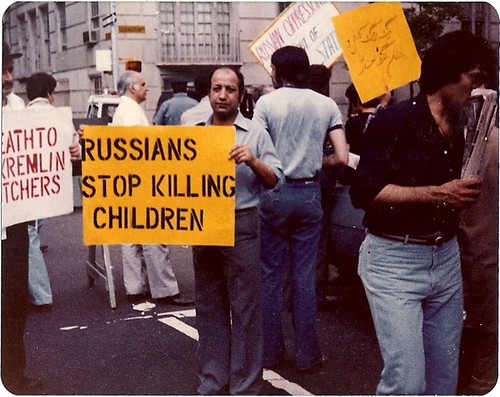*For this week's Family Journalism, I thought I would focus on the rising protests happening around the world.*
A review of local, national and global current events that can be shared and discussed among families with young children.
Libyans, Egyptians, Tunisians and Wisconsinites? (oh my) are protesting for a score of reasons. As the world watches - what are we to learn from what's happening? And why?A review of local, national and global current events that can be shared and discussed among families with young children.
Source: NPR, Reuters, Politico, ABC News
This is one of my favorite pictures of my Dad, peacefully protesting in the streets of Manhattan in 1980 - against Russia's invasion of Afghanistan - a relevant piece of history in our lives because it resulted in life changing experiences for millions of Afghans displaced by the war - including us. Those who sought refuge abroad continued to help fight back by raising public awareness as to what was happening on the other side of the world.

The kind of protesting happening around the world today has me somewhat dumbfounded. I'm having a hard time keeping track of the anger, the injustices, and the caliber of its widespread growth. Still - it's something that may be positively taught to our children -
There have been many times where I have felt myself demand, as a dictator would, that the kids listen to what to me, seems obvious and right. But they will protest with both arms crossed and sing an encore of reasons, or stand defiantly in silence, followed by tears heavy with anger. Ultimately, we are both passionate about what we believe in - and although at times we label this kind of behaviour as "testing their boundaries" - I also think its the beginning of defining their core value systems - which to me is more important than being right as a parent.
After all, it was the late Ghandi that said, "A 'No" uttered from the deepest conviction is better than a 'Yes' merely uttered to please, or worse, to avoid trouble."
- Table Talk: What does protesting mean? Give examples of when and why people demonstrate for what they believe.
If eating their veggies is the hot topic at the dinner table right now - like pouting or pressing their heads against their plates - they are in fact, "protesting" against the green stuff. Talk about whether this is an affective or ineffective approach - from their perspectives, and come up with examples together of how each you can better communicate your feelings about veggies, and then after wards, work towards a plan that both parties are happy with (like numbing the taste of broccoli with ketchup?).
- Educational: Chances are, there is a relative or friend of the family that is either currently residing in a country/state where the protests are happening or has actually been involved in or witnessed a protest or two in their past. Help the kids conduct a formal "interview" - and ask questions that will help them imagine what it is was like to protest with hundreds? thousands? and what people did and said around them... the outcome of the protest and its impact (if any).
- For more ideas on teaching about this topic: WaukeshaPatch - Mom's Talk, Positive Protesting with Children


No comments:
Post a Comment
Thanks for sharing - I will respond to your comment here as well so check back! xo